#dedicated to bach
Text
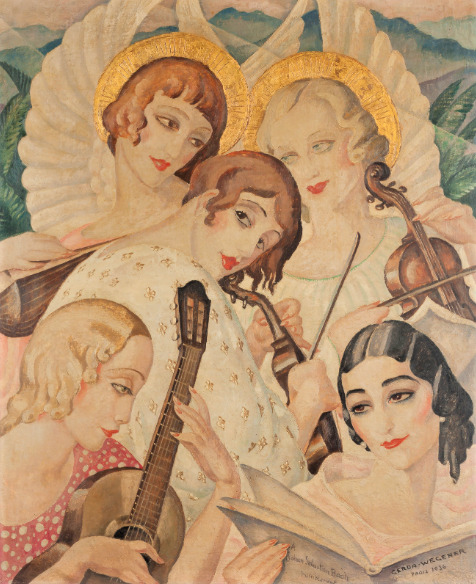

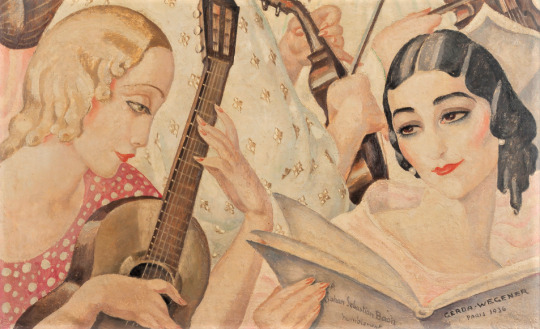
Gerda Wegener (Danish, 1885–1940)
A Johan Sebastian Bach humblement
signed, dated and titled 'GERDA. WEGENER/ PARIS 1936/ A Johan Sebastian Bach/ humblement' (lower right)
oil on canvas
39 3/8 x 31 5/8 in.
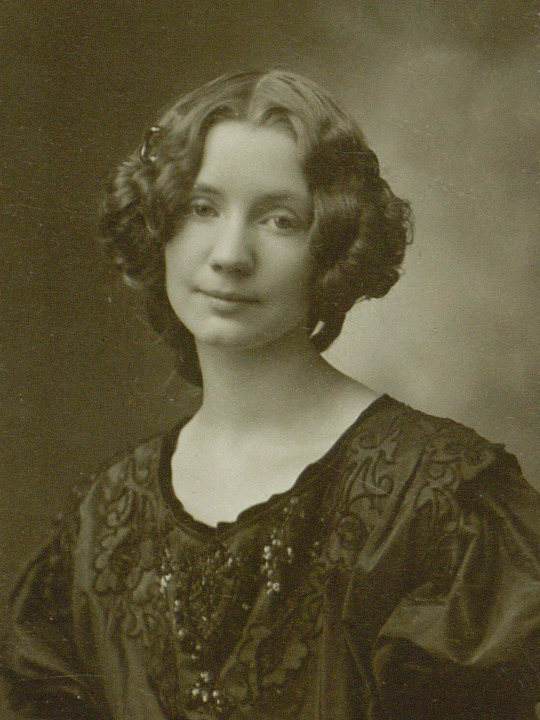

She met fellow artist Lili Elbe – then known as Einar Wegener – at art school. They married in 1904, when Gerda was 18 and Lili was 22. They travelled through Italy and France, eventually settling in Paris in 1912. The couple immersed themselves in the Bohemian lifestyle of the time, befriending many artists, dancers and other figures from the artistic world, often attending carnivals and other public festivals.
During this time Elbe began to wear female clothing, and adopted her female name and persona, becoming Gerda Wegener's favorite model, in paintings of beautiful women with haunting almond-shaped eyes dressed in chic fashions. In 1913, the art world was shocked when they learned that the model who had inspired her depictions of petite femmes fatales was in fact her husband.
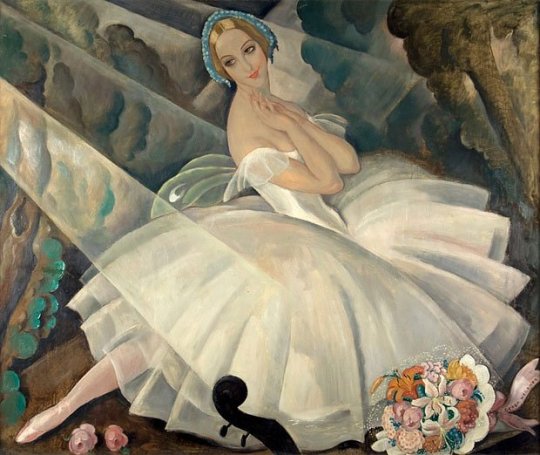


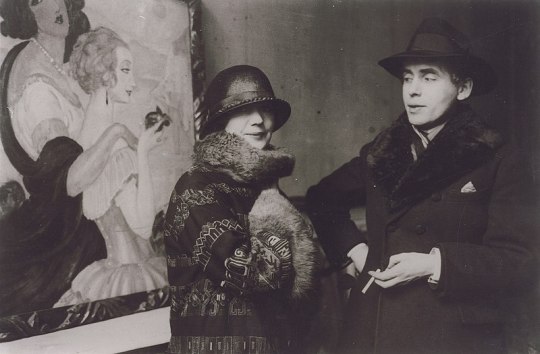
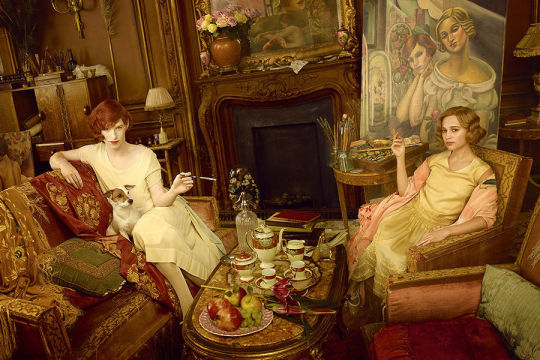
#art#gerda wegener#paintings#a johan sebastian bach humblement#wegener#bach#dedicated to bach#for back humbly#alicia vikander#eddie redmayne#einar wegener#lili elbe#cliff clavin
181 notes
·
View notes
Text
youtube
J.S. Bach - Orchestral Suite no.3 in D Major, BWV 1068 (c.1730)
I want to say I was listening to this one in my rocking chair next to my books on music. Or with wine and cheese at someone's party. No, I put this on while I washed the dishes. I thought I'd share my old post on this same piece but realized that I'd never written about this suite. And I don't have anything profound or introspective to say about it. It made taking down this mountain if dirty dishes feel like a grand accomplishment. It's a reminder that this music was written for the audience to enjoy. It doesn't have to be treated like music theory homework. That being said, I do like looking at the history of the orchestral suite, which would develop into the symphony. What can we hear from Bach's Proto-Symphony no.3? The Orchestral Suite was a carryover from France's Ouvertures. It would start with a slow section to draw in the audience, and then a lively counterpunctual exercise. After the "heavier" opening movement, the rest of the pieces are light dances, galanteries (minuets, bourrées, courantes, sarabandes, gavottes, allemandes, gigues, etc.). Because the German political elite had a taste for French art, they would have music played during their banquets and parties. Bach had no real interest in this kind of music (which would be a decent income source) because he was already dedicated to writing church music. But what few he did leave behind (we only have four Orchestral Suites attributed to him) sounds like great party music. The Suite in D Major is scored for 3 trumpets, timpani, oboes, violins, viola, basso continuo, giving it a louder sound than the others. The Ouverture starts with the slower grand statement announced by the trumpets and timpani. As you'd expect from Bach, this opens into a counterpunctual explorations of the melodies that developed out of the opening, but with the vibrancy of Vivaldi's fast paced concertos. The ending section cuts back and ends with a more subdued coda. The Air of this suite has stuck in our culture through films and TV, popular for its beautiful melodies. I remember first hearing it in the most ironic example I know; played during the library scene in Seven (or "Se7en") from the 1995 film. The ugliness and depraved misanthropy in the film is contrasted for a moment by the idealized "beautiful music" by an idealized "Great Composer". I thought it was showing the spectrum of human minds, that the "greatest" Baroque composer comes from the same human family as a lunatic serial killer using the Christian "Seven Deadly Sins" for gruesome punishments against his victims. Listening to it now I think it's fascinating that someone could have been touched or moved by the gorgeous Aria without words Bach wrote for whatever party or occasion, and she would have no idea that the same music would be heard again as so many of these festival pieces were back then. The latter dances show off the trumpets to make each one boisterous and lively. Two Gavottes with heavy emphasis on the beat, an upbeat Bourrée, and ending on the always fun and swaying Gigue. Of these dances I think I love Bach's gigues the most because they're always densely woven with his long waves of counterpoint across each instrument to create a dance that makes me think of old pub drinking songs or sailors dancing and drinking at sea. Another reminder that this music is supposed to be fun and enjoyable for anyone, and you can turn your own living room into an 18th century court for fun.
Movements:
Ouverture
Air
Gavotte I/II
Bourrée
Gigue
#Bach#J.S. Bach#Johann Sebastian Bach#Orchestra#Orchestral Suite#suite#music#classical#baroque#orchestra music#classical music#baroque music#Bach Orchestral Suite#French Ouverture#Air on the G string#Air#Bourree#Gigue#Gavotte#Youtube
19 notes
·
View notes
Text
THE PARADIS MIRROR MAGAZINE ISSUE #2


the new episode of the bachelorette just gets crazier (HUMAN RIGHTS VIOLATIONS???) ! let’s hear from some of the contestants!
EXCLUSIVES WITH THE BOYS (questions submitted by the viewers!)
“where do u see urself in 5 years?”
ARMIN ARLERT: i’m a magazine editor, so i’m hoping that one day i can have some sort of leadership role. only if my boss thinks it’s my time in five years!
EREN YEAGER: i’m hoping i can be a senior partner at my law firm within 5 years! it won’t be easy and it’s probably impossible but what an achievement that would be!
“what do they think of taylor swift/what's their favorite taylor swift song? (it tells you a lot about a man💀)”
ONYANKOPON: taylor swift? i’m not too fond of her. i hope that doesn’t get me kicked off the show.
JEAN KIRSTEIN: i’m not a big swiftie…i’m not a swiftie but her song ‘cardigan’ makes me think of my first high school love. obviously i’ve grown from that relationship but that break up was so hard and those lyrics match us so well. coming back and ending things. so, fuck you, taylor swift.
“how do you feel about marriage and kids?”
REINER BRAUN: i’m already raising a niece. luckily, i got to skip the baby stage but raising kids is already hard as is. i don’t mind having more though. it’s a learning experience. as for marriage…when you know, you know. maybe i will meet my wife on the bachelorette.
CONNIE SPRINGER: marriage has to happen. it’s been apart of my parents’ plan before i was born! all jokes aside, i’d like to get married, which is why i’m on the show! i have 2 siblings who are much younger than me, so i feel like a dad already. kids are cute, so i wouldn’t mind having some!
“Is Eren a hoe ?”
EREN YEAGER: i feel like i’m being targeted????
A LITTLE BIRDIE TOLD ME…: dirt on the cast
“Zeke has a monkey plushy he sleeps with at night”
If I were hit with human rights violation accusations, I’d hug onto my plushy too! Let’s let’s hope the accusations are just a joke. I don’t think they allow plushies in prison!
“Eren is uninterested”
I think have to disagree with this one. I don’t know why but I feel it in my soul that Eren wants y/n real bad.
“Jean has an STD and a bunch of bumps on his d*ck”
HELLO??? The last bachelorette dropped her pants once on the show. Let’s hope y/n is safe about it and that this isn’t true. Would hate to watch that go down. 😬
“eren and armin hooked up last night.”
Would this count as cheating? I mean, be who you are but remember what you’re on the show for.
“I think Zeke is trying to get y/n to pick eren”
After last week’s episode, it’s starting to look like it. And Eren got the best date too! No weird parenting game, no lack of care during a date. Mf went to DISNEY!!! Favoritism much??🤔
only two episodes in and the bach is taking quite a turn! until next time!

hey again! i’ll take a few more votes and responses before closing the poll and posting the chapter. i will try and get on my zoom again!😭 all my school stuff is starting up again and i’m much more dedicated to that.
i do want to address the poll! in regards to the questions, i’m looking for these answers:

not these:

the majority of the bachelorette is reader based. you write the stories! just wanted to address it bc i think we all got a little confused 😭
anyways, here’s the poll! if you already answered the written answer questions, feel free to skip (just let me know in the poll!). until next time :3
taglist: @katestrophes @taylarxse @invisible-mori @tanakaslastbraincell @mrsharuchiyo @parkerluvsu @conniesbbymama @444ctrl @gabbadabbad00 @cvberidiot @maliagurl @greeniegreengreen @teanica @illgrrl @asymetricstar @llovesero @haitainiwhore3 @durag_tanaka @crazychaoticizzy
#black reader#black yn#aot x black reader#aot x reader#jean kirstein x reader#jean x black!reader#eren x black reader#eren yeager x reader#armin arlet x reader#armin x black reader#connie springer x reader#connie springer x black reader#onyankopon x reader#onyankopon x black y/n#reiner braun x reader#reiner braun x black reader
65 notes
·
View notes
Text
Anonymous asked: What’s your favourite piece of classical music that you discovered through a film soundtrack?
What an interesting question to which I have had to really scratch my head and think a little. The main issue is that if you are, like me, one of those kids who was exposed to classical music and some of its canon from an early age then the question becomes harder to answer. Like many other children, I was taught to play musical instruments and have music lessons from about 6 years old onwards. Films, especially the more adult themed ones with a classical score, were something you discovered much later in your teens onwards. So I’m going to cheat a bit here and there. For example I can’t include Milos Forman’s classic movie ‘Amadeus’ because I was already familiar with a range of Mozart’s repertoire before watching it.
Predictably, I’m going have to start with Walt Disney’s classic film ‘Fantasia’ (1940). This was perhaps the first film I was truly exposed to classical music in all its glory. It was Disney’s love letter to classical music and I can still watch it with child-like wonder at the magnificent music set to an incredible animation.
I’m pretty sure that Igor Stravinsky almost certainly wasn't thinking of dinosaurs when he wrote his ballet The Rite of Spring. But Walt Disney and his talented team of animators decided to tell the story of these prehistoric creatures using the dramatic, angular sounds of Stravinsky's masterpiece. And it's become one of the most famous sequences of the 1940s film.

The score was performed by the Philadelphia Orchestra under Leopold Stokowski and was narrated by composer Deems Taylor was awesome. As magnificent was the music that Toccata and Fugue in D minor by J. S. Bach, selections from The Nutcracker Suite by Pyotr Ilyich Tchaikowsky, The Sorcerer’s Apprentice by Paul Dukas, Pastoral Symphony (Symphony No. 6) by Ludwig van Beethoven, and the “Dance of the Hours” by Amilcare Ponchielli, it was the last two pieces that left a real impression. Of course I’m talking about Night On Bald Mountain by Modest Moussorgsky, coupled with ‘Ave Maria’ by Franz Schubert.

I’m also going to add Léo Delibes’ Flower Duet (from the opera Lakmé). I used to hear this ad nauseam but not in a movie. This classic piece was the chosen soundtrack for the British Airways advertisement on television and in their departure lounges and flights. The ad - updated often - has been around in one form or another but with the same soundtrack since the 1980s. It was a huge feature of my childhood in the 90s. Whenever I boarded a flight in the Far East or South Asia or the Middle East to fly back home to Britain - because we lived overseas - you would hear this as you strapped yourself in to your seats.
As for my main list (in no particular order):
youtube
Second movement of Beethoven's Symphony No.7 from: The King’s Speech (2010)
The climactic scene where King George VI has to make his speech ‘unto the nations’ was made more powerful by this piece. Like King George VI and his personal battles with his voice, much speculation has taken place over what personal agony the musical piece reflects in Beethoven’s life, especially since sketches for the movement predate the symphony by several years.
One clue is that Beethoven, who conducted the premier in December of 1813 for the veterans of the Battle of Hanau, made an address to these veterans, saying: "We are moved by nothing but pure patriotism and the joyful sacrifice of our powers for those who have sacrificed so much for us." There is every reason to believe that the deep emotion of this movement was founded on anything but what he said it was. His sentiment had existed long before 1813, as had the wars. Napoleon was being repelled, and the symphony is overall joyous.
However, Beethoven was not the kind of man to casually dismiss sacrifice, and the concert was dedicated to veterans. I believe that this movement celebrates those military veterans who made sacrifices for their nation, in much the same way King George VI was asking his subjects in Britain and the Commonwealth in the fight against evil menace of Nazism and Fascism.

Ligeti's Lux Aeterna and Requiem from: 2001: A Space Odyssey (1968)
I hated it. I saw it as a teen and I thought something was wrong with the audio. I still hate the piece but at least I know who Ligeti is. It was way too avant garde for me back then and it remains so today. I think scratching your nails down a chalk board has more melody than a piece by Ligeti. Kubrick clearly loved his work and used it in his other films such as The Shining and Eyes Wide Shut.
Richard Strauss - Also Sprach Zarathustra from 2001: Space Odyssey (1968)
By contrast I loved it. Music can be the difference between a highly memorable scene and one that leaves viewers with an indifferent shrug. It’s hard to believe that this classical piece was used in the main opening scene of the film originally as a temporary place holder by Kubrick whilst he waited for the film composer, Alex North, from the full soundtrack. In the end Kubrick left Strauss in and it made all the difference.
youtube
Franz Schubert’s Piano Trio in E-Flat from: Barry Lyndon (1975)
The Piano Trio No. 2 in E-flat major for piano, violin, and cello, D. 929, was one of the last compositions completed by Franz Schubert in 1827 and one of the last pieces he heard being performed before he died. The track itself has been used in countless of movies over the decades such as The Hunger, Crimson Tide, The Piano Teacher, L'Homme de sa vie, Land of the Blind, Recollections of the Yellow House, The Way He Looks, The Mechanic, Miss Julie, The Congress, and the HBO miniseries John Adams. But I first heard it on Kubrick’s film Barry Lyndon and remember being captivated by the film and the music. I was a teen watching it my parents and the whole scene at the card table was beautifully directed and wonderfully lit. As I learned much later in life, Kubrick and his team invented new kind of film lens to be able to film in candlelight.
Handel's sarabande from: Barry Lyndon (1975)
The sarabande is traditionally the music written for a courtly dance in triple metre. Handel's version was composed for solo harpsichord at some point between 1703 and 1706 and first published in 1733. This classic piece is the 4th movement of the Cette pièce est le quatrième mouvement de la Suite in G minor composed for the harpsichord. Although the Sarabande was originally intended by its composer to be played solo on harpsichord, the orchestral version of the Sarabande is very well known these days thanks to the Barry Lyndon film. Moreover, the Sarabande is beloved by filmmakers and has been adapted several times for various films. It’s one of my favourite pieces and it reminds me of the English countryside for some reason rather than some formal court dance.
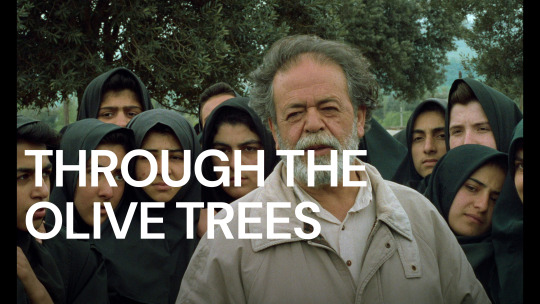
Domenico Cimarosa’s Concerto for Oboe in C Moll from: Though the Olive Trees (1994)
Directed by Abbas Kiarostami, this little known Iranian-French film was something I stumbled upon through my Norwegian mother who loved these kind of independent films when we lived in South Asia as an antidote to all the Bollywood films we children enjoyed. Kiarostami’s film traces the trouble arising when the romantic misfortune of one of the actors on a film set - a young man who pines for the woman cast as his wife, even though, in real life, she will have nothing to do with him - leaves the director caught in the middle. In hindsight I can now say it was a metafictional masterpiece. Kiarostami contemplates cinema and its romantic fallacies. The film is gorgeously grounded in Northern Iran’s folk traditions and with a soft focus on its shaken yet convalescent landscape. It’s a warmhearted tale that explores what happens when love goes unrequited - which was surprisingly relevant to a teen with raging hormones at the time.
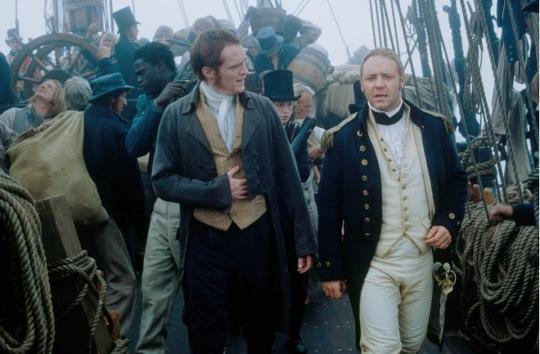
Ralph Vaughan Williams’ Fantasia on a Theme by Thomas Tallis from: Master and Commander: The Far Side of the World (2003)
A classical musical masterpiece in a masterful cinematic movie - both epic in every sense of the word. As a former British Army combat pilot it’s the only film that made me have a smidgen of sympathy with the Royal Navy. It was one of the first films I was allowed to go and see at the cinema itself as a teen. The film is almost faultless in terms of acting, directing, cinematography, and authentic detail. It even made me go and read one or two of the books by Patrick O’Brian. How Peter Weir never won an Oscar for directing I shall never know.
Vaughan Williams’s Fantasia on a Theme by Thomas Tallis is a 15-minute (or so) work for double string orchestra and string quartet, based on a melody by the 16th century composer Thomas Tallis. The quartet traditionally sits away from the orchestra in performance, to create an atmospheric antiphonal (alternating voices) effect. It is often known simply as the ‘Tallis Fantasia’. The tune is from a setting of Psalm 2 that Tallis wrote in 1567. It originally sets the words ‘Why fumeth in sight: The Gentils spite, In fury raging stout? Why taketh in hond: the people fond, Vayne things to bring about?’ It was in 1910 at a festival that Vaughan Williams himself conducted the London Symphony Orchestra in the first performance, which was followed in the same concert by Elgar conducting his own The Dream of Gerontius. Vaughan Williams, in his late 30s, was already establishing himself as a major name, but the Tallis Fantasia raised his profile even higher, not least because the concept of harking back to the 16th century was a comparatively new one.
The piece by Vaughn Williams is what has stayed with me throughout the years. In a nod to Proust, I chiefly identify the piece with reflections of my time on the battlefields of Helmand during my time in Afghanistan and especially seeing wounded friends and comrades long after we got back home from war.
youtube
Carl Orff’s Carmina Burana from: Excalibur (1981)
I was already familiar with bits and pieces from Wagner’s operas - played loudly in our home by my parents - but I must admit this classic piece by Carl Orff I first heard watching John Boorman’s magical and majestical film about King Arthur and his knights of the Round Table. I know this piece has been used endlessly in other films and even gained fame as a men’s aftershave advertisement (so my father says) but I first heard it watching this film.
John Boorman’s 1981 fantastical retelling of Thomas Mallory’s Le Morte d’Arthur is, to quote Nicol Williamson’s Merlin in the film, “A dream to some. A nightmare to others!” It can sometimes come across as an episodic and hammy sword and sorcery tale, but I saw it as clever and satisfying retelling of an evergreen myth. I had read read Mallory’s epic books and so my expectations were unduly high. For the most part they were met and then some. Boorman took an abstract approach that shows us Arthur’s (unnamed) Kingdom, a place out of time, in several stages of transition; from dark to golden age, via loss of innocence, and painfully bloody rebirth. Excalibur arose out of the ashes of Boorman’s earlier attempt to bring J.R.R. Tolkien’s The Lord of the Rings to the screen (ironically after trying to get a filmic retelling of the Merlin myth off the ground).
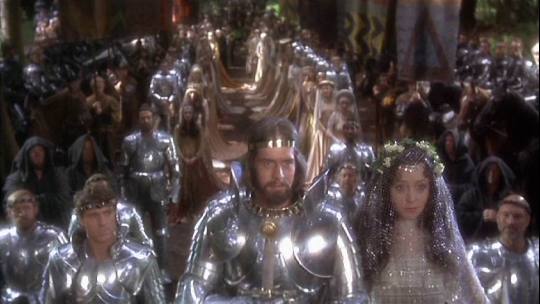
Excalibur is a cautionary tale. The characters are all struggling to find their place in the world, to maintain harmony with nature. Merlin says poignantly of Excalibur to Arthur, “It was forged when the world was young, and bird and beast and flower were one with man, and death was but a dream.” The film is a longing for a golden age, and the struggle to balance the warring natures of honour and goodness with human greed and jealousy. Surely the most rousing image is when Percival has returned the Grail to Arthur who, rejuvenated, also recovers Excalibur from Guinevere (now a nun, to atone for her adultery with Lancelot). She has kept it safe, knowing her once and future king would one day seek its power. Merlin is unfrozen by Arthur, and even Lancelot, a raggedy wild man driven into exile by his own shame, heeds his true king’s call. Arthur rides out with his knights and these fellow warriors through a re-blossoming countryside to do battle with Mordred for the soul of the land, to Carl Orff’s stirring music.
The name of Orff’s piece has Latin roots. 'Carmina' means 'songs', while 'Burana' is the Latinised form of Beuren, the name of the Benedictine monastery of Benediktbeuren in Bavaria. So, Carmina Burana translates as Songs Of Beuren, and refers to a collection of early 13th-century songs and poems that was discovered in Beuren in 1803 - although it has since been established that the collection originated from Seckau Abbey, Austria - and is now housed in the Bavarian State Library. The songs (over 1000 of them) were written in a mix of Latin, German and medieval French by the Goliards, a band of poet-musicians comprising scholars and clerical students, who celebrated with earthy humour the joys of the tavern, nature, love and lust. Although Orff set the original texts, he chose not to use the primitive musical notation that accompanied some of the songs. The collection was first published in Germany in 1847, but it wasn’t until 1934 that Orff came across the texts; a selection had been translated into English and formed part of a publication called Wine, Women And Song. With the help of Michael Hofmann, a law student and Latin scholar, Orff chose 24 songs and set them to music in what he termed a “scenic cantata”.
It was in this form that it was first heard on June 8, 1937, in Frankfurt, under its full title Carmina Burana: Cantiones Profanae Cantoribus Et Choris Cantandae Comitantibus Instrumentis Atque Imaginibus Magicis (Songs Of Beuren: Secular Songs For Singers And Choruses To Be Sung Together With Instruments And Magic Images) Quite a mouthful! After the triumphant premiere of Carmina Burana, Orff, then 41, wrote to his publishers: “Everything I have written to date, and which you have, unfortunately, published, can be destroyed. With Carmina Burana my collected works begin.” However, nothing Orff subsequently wrote ever came close to approaching the popularity of Carmina Burana. Oh dear.
youtube
Richard Wagner’s Siegfried’s Funeral March (from the opera Götterdämmerung) from: Excalibur (1981)
The film almost plays like a screen Opera - it is a heightened reality, a world anew. One where sex, jealousy and pride threaten to undo the mystical balance and ties between the King and the land. A powerful aid to that feeling is the superb score which utilises music such as Siegfried’s Funeral March by Wagner, and O Fortuna, a medieval poem set to music by Carl Orff. Boorman was determined to squeeze as much of the legend into his film’s running time as possible, chopping and condensing characters, and switching acts around. He created a three-act saga - the dark ages and the birth of Arthur, a period of brutality and superstition; the rise of Camelot and its age of reason, law, and dawning of Christianity; and the final descent into chaos and wasteland, where a frail Arthur commands the Round Table knights to seek out the Grail. Arising out of this a final battle commences for the soul of the land and the people, a sense of renewal with a promise of a new age to come. Boorman called it the “past, present and future of humanity.”
Richard Wagner composed his opera Götterdämmerung between 1869 and 1874. It is the last of the four operas that make up Wagner’s Der Ring des Nibelungen cycle, a project that had taken him over 25 years to complete. The opera is much renowned for its orchestral sequences, and these are often performed as concert extracts. Siegfried's Funeral March is taken from Act Three after Siegfried has been murdered by Hagen. Following his murder at the hands of Hagen, the death knell of “Siegfried’s Funeral March” opens with funereal timpani as Siegfried’s body is placed on his shield and carried off by the vassals. The music vacillates from deep mourning and rage-filled outbursts to the majesty of the “Hero” motif, brought out in bold relief at the centre of the movement.The whole opera is made up of musical motives from previous operas that tell of Siegfried's background, including the Volsung theme, Siegmund and Sieglinde's theme, the Sword, Brünnhilde's love theme and the curse of the Ring.
youtube
Richard Wagner’s Ride of the Valkyries (Die Walküre) from: Apocalypse Now (1979)
Francis Ford Coppola's Vietnam War phantasmagoria is an epic fresco oozing with madness. It is a madness that manages to escape from the frame and infect the director and his team, turning the film into a legend. It is impossible not to talk about this film without mentioning the Dantesque shooting of the film. A typhoon that destroyed the sets, a heart attack that nearly killed Martin Sheen, a Brando who was more obese and obtuse than ever, who arrived on the set without knowing his lines, and a director at the end of his rope physically and psychologically, on the verge of divorce and suicide. Instead of taking four months to complete, the shoot lasted 15 months. The analogy with the hell of Vietnam is obvious.
The film itself is about Benjamin Willard, a special forces captain, who is given a highly perilous mission: to find and assassinate Colonel Kurtz, a renegade who has set up his headquarters on the Cambodian border. To accomplish his mission, Willard must travel up a river in a small patrol boat with a handful of men. We follow Willard sinking into the madness and insanity of this war, personified by the character of Colonel Kurtz, an obese Buddhist, a true godfather of the Vietnamese jungle. Apocalypse Now is in fact a mirror for the spectator, it plays on our feelings about the Vietnamese conflict, and this is what sets it apart from other great war films. It is a physical and very real journey through Vietnam, but also an inner journey for its hero, Willard, a drug addict and alcoholic, which will allow Coppola to make his denunciation of the war. After watching this movie over several years I’ve come to regard Coppola’s movie as more than just a war movie but also an hallucinatory trip, as anxiety provoking as possible, about the human soul lost inside itself.
For a movie that had two of my greatest loves - combat helicopters and Wagner - the film surprisingly didn’t inform my future career path as a combat pilot for the British Army. I was too young as a teen and caught up with other feminine things girls of my age did. But watching it retrospectively I’m sure it had some unconscious influence on me. I noticed things more with each viewing such as before Jim Morrison's paradoxical and delightful prologue, it is the helicopter blades that open Apocalypse Now. The jerky noise that spatialises this mortifying horizon is a motif that will be the melodic line of the entire film. In crosshatching, it truncates reality and allows the initial confusion of a man in reverse who opens his eyes on an uncertain world. The fan in the hotel room is not the air-conditioned shelter of war. Everything, from then on, is under the sign of duality.

Then of course we have the euphoric scene but no less horrifying than the helicopter attack by Kilgore and his men to lay waste to a village so that they could surf. And all done to the terrifying bombast of Wagner’s Ride of Valkyries. It’s a demented scene but also so visually lyrical. Wagner’s Ride of the Valkyries is sadistically perfect. It’s a perfect mythical metaphor of the valkyries who majestically flew in the sky and decided who died in battle from above. Of course the symbolism of Wagner - wrongly tarred with its fascist connotations - as a place holder for Western imperialism over the Vietnamese is not lost on the viewer. It’s a clever piece of juxtaposition.
Armies have of course used music in warfare for millennia. The deployment of musicians - from trumpeters to drummers - in battle was useful in instilling regimentation and rhythmic purpose for soldiers; and in days before radio, in carrying specific orders across the battlefield. As well as unifying an army - it could potentially disorient the enemy, or as Kilgore eruditely elaborates: ‘We use Wagner, it puts the shits up the slopes. My boys love it!’. So what we are seeing is an age old military tactic being given a modern twist. This has already been established by the notion of an air cavalry, trading their horses for helicopters - which gets further embodied by Kilgore’s wearing of a cowboy hat, common to the Western film genre. The symbolism of linking old and new - ancient and modern, history and the present - occurs throughout Apocalypse Now, as it does in the original novella Heart of Darkness. It indicates an uncomfortable continuum, a never ending foreboding cycle. That beneath the fragile veneer of civilisation, humanity is endlessly repeating barbarism - a cycle foreshadowed by helicopter/fan blades at the start of the film which also loops back to become the end of the film - itself a cycle that won’t end.
When I flew combat helicopters over in Afghanistan we were banned from playing music in our cockpit. It’s simply not practical because you need to be aware of all your aural cues of what the hell is going on around you as every mission is task intensive. You’re focused on a mission where the shit can hit the fan such as coming under rocket attack at any second especially if you’re on a night mission. In theory you could, as anyone with some audio equipment and electronics knowledge could wire in a 3.5mm headphone jack and hook up your music into your own helmet. I knew some pilots who broke the ban and did this. They would get their clever avionic ground staff technician crew to put in a some sort of patch cord that could plug through to their helmet ICS - in return you get them a case of beer. I’m not telling where we got the beer from.
Other honourable mentions:
Second movement of Schumann's Piano Quintet from: Fanny and Alexander (1982)
Gaetano Donizetti’s Lucia di Lammermoor "Il dolce suono" from: The 5th Element (1997)
Rodrigo's Concierto de Aranjuez from: Brassed Off (1996)
Maurice Ravel’s Trio en la mineur pour piano, violon et violoncelle, Sonata for Violin and Cello, Violin Sonata #2 in G, and Berceuse Sur le Nom De Gabriel Fauré from: Un Coeur en Hiver/A Heart in Winter (1992)
Mozart’s Divertimento in D major, K. 136 from: Out of Africa (1985)
Carl Orff - Schulwerk Volume 1: Musica Poëtica - Gassenhauer from Badlands (1973)
Puccini’s O mio babbino caro (aria from the opera Gianni Schicchi) from: A Room with a View (1985)
Verdi’s La forza del destino (the Force of Destiny) overture from: Jean de Florette (1986)
Mozart’s Letter Duet (from The Marriage of Figaro) from : The Shawshank Redemption (1994)
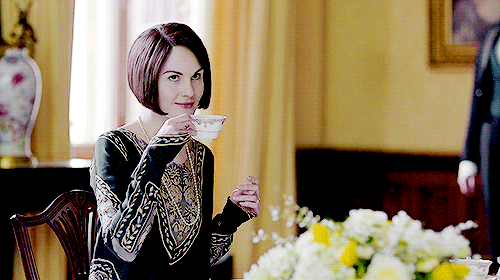
Thanks for your question
#ask#question#music#film#soundtrack#movie#cinema#film soundtrack#composer#classical music#arts#culture#personal
63 notes
·
View notes
Note
Hello!
Can you do headcanons of the S+M+T+Kino teaching their S/o to dance for a ball
Hello darling, I absolutely love your idea!
This was so much fun to write and I spent the whole day doing it. Maybe I got a little obsessed lol
Thanks for your ask. I hope you enjoy it! ૮ • ﻌ - ა

Dance classes with diaboys
Sakamakis
Shu
Shu never wanted to do this; it wasn't his idea in the first place. Reiji and his father pretty much coerced him into doing this. As the eldest brother and the heir, it's Shu's responsibility to organize the ball.
Since Shu is the next king, his partner will attend lots of royal balls. So, they must learn how to dance.
Reiji convinced him to teach his lover how to dance and act for balls, or else he would do it himself. Of course, Shu wouldn't let Reiji step close to his beloved person, so now he's teaching them how to dance.
Shu is a skilled teacher. In the manga, he teaches English to Yui and even tries to teach her how to play the violin (which doesn't work, lol). He's the type of teacher that makes everything seem easier than it is. He knows that pressuring someone to learn/do something isn't the best way to teach.
Learning with Shu is all about going with the flow; he'll guide you the whole time. However, he'll demand your attention and effort, since he's sacrificing his precious Bach listening time to teach you how to dance.
He'll complain about how this is a pain, but as the days go by, he starts to enjoy dancing with his lover and even looks forward to it.
By the end of the month, they'll be dancing perfectly in sync with each other, much to Reiji's initial surprise and delight, given that he thought them to be a bunch of incompetent good-for-nothings.
These things also bring Shu flashbacks to Edgar, and how happy he always seemed when he went on with one of the family's annual balls. Edgar was always so excited about the ball, and he would light up the room with his smile.
Reiji
Reiji is a perfectionist by nature, but when he received news of the incoming ball, he went wild. He was almost like a dictator, ordering everyone around. But with his lover, he was even more strict.
Reiji is already accustomed to taking on the role of teacher in his relationships, correcting his lovers' flaws and demanding impeccable behavior on a daily basis. So, when it comes to royal balls and being a perfect lady, he expects nothing less than your best behavior if you want to walk beside him.
He considered hiring a professional dance teacher with experience teaching members of royalty, so his significant other would learn how to dance properly. But Reiji's arrogant ass thought he would be the best in this situation.
Reiji created an entire, comprehensive schedule for his lover, which includes all kinds of classes you can imagine, from dance to etiquette. This schedule is designed to help you learn how to behave and act properly at a ball. He wouldn't let anyone bring Sakamakis' name or reputation to mud.
He's very methodical and patient, but he often threatens his lover with punishments if they don't comply with his expectations. He'll point out every single flaw on his partner - posture, expression, steps, everything - until they're completely compliant.
The best part of learning how to dance with Reiji is that the final results are always stunning. The process is long and difficult, full of intense practices and criticism, but the results are always worth it in the end.
After many corrective punishments and long weeks of hard work, his partner will be polished and well-trained like a diamond, and he will even praise them for their hard work and dedication ( that's rare)
Ayato
Now, this one is really chaotic and funny. Ayato does know how to dance and does it well, that's canon. But he doesn't know how to teach someone and doesn't have the patience to do it. He's the type of guy to say " just follow me." But when his lover steps on his feet, he gets angry.
Reiji was determined to make Ayato go to the ball, even though Ayato hates everything about them. He grudgingly agreed, knowing that if he didn't, Karlheinz would likely banish him to the North Pole or outer space. So, Ayato set out to teach his partner how to dance.
At first, it was really chaotic, and he spent more time asking for blood than teaching them. But then Ayato realized that it's not his lover's fault for not knowing something like royal balls. Then he goes to Reiji, indirectly asking for help.
Reiji provides him with some tips and tricks on how to improve his posture and other stuff, but ends up criticizing him, anyway. Then Ayato tries to be more patient with his lover, which surprisingly works out for the better.
(I really think that there would be a lot of sexual tension between his partner and him, just because when Ayato is more focused, he looks really hot BWHASHSKH)
Ayato is one of those fun, engaging teachers that makes learning enjoyable. You'll have so much fun dancing that you won't even realize how much you're learning. But it only happens when he's really committed to doing it.
He's going to constantly provoke and tease his lover about how bad they are at dancing, no matter how many times they insist that they're getting better.
I feel as if dancing with Ayato has the same energy and awkwardness as teenage prom dances in movies. That weird tension and excitement between the characters.
Ayato and his lover gradually become more in sync with each other as they spend more time together.
By the end of the month, his s/o will be dancing pretty good with him, and Ayato gets all cocky saying that "Ore-sama is the best teacher; even the clumsy chichinashi learned how to dance with me!"
Also, he'll demand a lot of blood from his partner.
Kanato
CHAOS, CHAOS, CHAOS!!!!
Kanato is an incredibly impatient person who would be the absolute worst person to ask to teach someone how to dance. He would get frustrated easily and would likely give up on the person within minutes. If they step on his foot, they'll be dead before they hit the ground.
I would love to be able to tell you that he would be an amazing person to spend time with and that you would have an incredible time. But I would be lying. His tantrums and screams make it hard to believe.
Unless his partner already knew a little about dancing or at least was cautious, I don't think he'd put up with teaching them. He's not a very patient teacher and gets frustrated easily.
But once they learn how to dance without stepping on his feet, it's going to be really nice
They'll have tea parties after every dance class
Laito
Oh lord... his partner must be really patient to deal with Laito. Not because he's short-tempered or anything like that; if anything, he's very patient, but he's going to turn dance classes into some kinky shit. Laito is always trying to find new and innovative ways to bring sex into every aspect of their relationship, and the dance classes are just his latest scheme.
Laito is an excellent teacher, and I honestly believe that. However, he will take advantage of this situation to say some dirty things, or to roam his hands all over his lover's body.
The best part about Laito is that he's an excellent dancer and teacher. He's able to guide his partner with ease and patience. And he won't get too mad if they make a mistake or step on his feet.
"Bitch-chan, please be more cautious and don't step on my feet again or else I'll have to punish you fufufu~"
Subaru
This boy is the sweetest. He'll say he's not good at dancing, but he's just being modest. He's actually an amazing dancer and will leave you mesmerized when he moves.
Dancing with him is like a dream come true. His hands are so strong and gentle, and his body moves with his partner's perfectly
He won't be mad if his lover makes mistakes because he understands that old-fashioned things like balls are no longer as relevant or popular as they once were. He himself doesn't particularly enjoy balls or events like that.
Subaru is always extra careful and gentle while teaching his lover, making sure he doesn't hurt them or make them feel uncomfortable in any way.
It's so cute and funny- the entire atmosphere. He's blushing an adorable, deep red and can barely look into his partner's eyes. I can tell he's really embarrassed, but he's also really into it and enjoying himself. They keep making eye contact and sharing these adorable little smiles. He's definitely into his partner and enjoying the experience, despite being a little embarrassed.
Dancing with Subaru also has this classic teenage movie vibe, where the characters are incredibly awkward but endearing, and you can't help but root for them as they dance romantically in the moonlight. It's one of those feel-good movies that you'll want to watch again and again.
Kino
Kino is quite nonchalant about the whole situation, only caring about whether he's having fun. He finds it problematic having to teach his lover how to dance, but he sees it as more of a game than anything else.
Kino learned how to dance traditional ballroom dances, so he'll try to do the same leading and following steps he learned with Yuri when he dances with his significant other.
While guiding his partner through the dance steps, he keeps mumbling the counts aloud under his breath, "1,2,3…1,2,3."
Once his partner finally manages to follow in his footsteps and gets into a similar rhythm, he starts to pick up the pace. But this approach doesn't work, and both of them end up stumbling and falling to the ground.
They decided to call it a day and come back tomorrow with a fresh start; however, the next day, Kino woke up with a throbbing headache from where he hit his head. Kino's humor might not be the best, but he doesn't give up on a challenge.
After disastrous weeks of dancing to half-finished songs, they finally danced a whole song from start to finish without any major missteps.
Mukami
Ruki
(THIS IS MY DREAM GEEZ)
Ruki knew that his significant other didn't have any experience with dancing, so as a good and considerate master, he decided to teach her. Learning with Ruki is very straightforward, maybe because he spent his whole life teaching things to his younger brothers.
He's one of those highly sought after, experienced teachers who has the unique ability to go with the flow, guide you naturally and effortlessly through the material, making it easy to understand and remember.
He might use the carrot-and-stick method to teach his lover, but he'd be softer on punishments and more lenient with rewards.
He would definitely be softer and more gently to his partner after having an established relationship with them, as he canonically treats Yui better after they are together.
Even though sometimes Ruki looks for reasons to punish his lover, while teaching them how to dance, is not one of them. Since there is a royal ball coming up and Karlheinz will be there, Ruki wants to make sure their dancing is perfect.
Ruki is an extremely effective teacher because of his straightforward and easy-to-understand teaching style. He gives clear instructions and provides immediate feedback to correct any issues while his partner is dancing. This makes learning very easy and enjoyable for his lover.
In the Lunatic parade, he flawlessly guides Yui while they're dancing. She doesn't have any experience with dancing, but it becomes abundantly clear how quickly and easily you can learn with Ruki.
Dancing with Ruki can be a bit of a challenge for his partners, as they often find themselves getting lost in his cold blue eyes. He's not one to scold them for it, but he does make sure to keep them focused on their steps.
( It's hard to take him seriously when he's got that smirk on his face and he's talking in that teasing tone.)
His significant other will be dancing with the utmost grace and precision in a mere matter of weeks.
"Oi, livestock! I know you want to admire your master, but that's not the time for it! Pay attention to your steps!"
Kou
Ok, Kou is an idol, but he is terrible at teaching because he can't handle when his lover makes the same mistakes over and over again.
He'll probably end up sucking their blood, since that's what vampires do in a give-and-take world.
At first, Kou had wanted to give up and hire a professional to do it instead, but Ruki wouldn't let him. However, since it was his lover that they were talking about, he decided to train his partner up like a trainee.
Most people wouldn't expect that work could be fun, but in a couple of weeks, they were having a blast. Learning with Kou isn't hard, only because dancing is his job and he's very good at it. He breaks down the steps simply and easily, so that even those with two left feet can understand and follow along
"Woah, you're getting better at this M-neko chan~"
Yuma
THIS BOI, OUR PRECIOUS GARDEN BOI, he can't dance.
No matter how much you try to convince me, I simply refuse to believe that Yuma has any sense of rhythm or gracefulness when he dances. If he does dance, it looks incredibly awkward and clumsy.
So with Yuma, it's a slightly different dynamic than it is with other boys. He won't teach his lover; rather, he wants to learn with them.
Probably Ruki's going to teach them how to dance properly, but the good part is that Yuma is a fast learner. He'll be able to quickly adapt and learn the steps, so he won't be embarrassed at the ball.
Yuma's main problem when it comes to dancing isn't the steps - it's that he's pretty tall, which can make him look clumsy when dancing with someone shorter.
But he's a hard-working man and with a couple of dance classes by the end of the month, he'll look like a whole new man.
Once Yuma and his lover have learned how to be in perfect harmony with each other, he will effortlessly guide them through the dance. Dancing with Yuma has Beauty and the Beast vibes.
Azusa
This sweet, talented boy dances so well - with such elegance and precision - that you can't change my mind. Azusa looks like a prince when he dances, full of graciousness and charm.
He's an absolute sweetheart and will be more than happy to teach his partner how to dance. They'll learn quicker than you could have imagined.
And guess what? He doesn't mind if his partner steps on his feet; if anything, he's going to love it. BWHAHAHA
Azusa won't try to hurry his partner along or force them to learn at a pace they're not comfortable with; he's content to follow their lead.
He will be as gentle and loving as possible, and if you look closely, you'll see his bright smile while he stares adoringly into his lover's face.
He'll get so used to dancing intimately with his lover, that he'll want to slow dance together every night in their living room.
Tsukinami
Carla
OOF-
THIS MAN. DANCING WITH THIS MAN IS SO SJJHDDHDH (simp time)
This happens on dark fate, I guess, and I'm sure that Carla warns Yui that if she steps on his feet, he'll have to punish her. I have no idea if he's bluffing or not. This man is a mystery sometimes.
If he's the one teaching them how to dance, just like Ruki or Reiji, his lover won't have to worry so much (I mean... only about the punishments), because you'll be able to dance with precision and skill.
Carla is a king, so it is obvious that he knows how to dance with the utmost grace, elegance, and poise.
He is an experienced man who has been dancing for most of his life. He knows all the steps and moves, and he could easily guide someone around the dance floor.
Carla will have an amazing time waltzing with his lover in the stunning ballroom of his castle.
Carla will give them tips and will chat with his lover. For him, teaching his partner is such a quality time. He loves being able to teach them new things and help them grow as a person.
He won't tolerate slacking off from his partner, as the king of founder's partner, they must be perfect and be able to walk by his side.
Shin
It was Carla who told Shin to teach his partner how to dance, and since his brother asked, he couldn't deny.
Shin is a good dancer. He doesn't really like balls, but he has learned how to behave properly at them.
Just like Ayato, he'll tell his partner to follow him. Shin doesn't really make much of an effort to properly teach his lover, but he doesn't give up easily either.
It was weeks of chaotic fun until his significant other finally learned to swing along gracefully in the ballroom without stepping on his feet or stumbling around.
When this long-awaited day finally arrived, Shin was overcome with happiness and relief. Knowing that his brother wouldn't complain and he would be able to have fun while dancing with his lover in his arms all night.

Masterlist
Ask box is open!
#diabolik lovers#diaboys#diahell#dialovers#mukami brothers#sakamaki brothers#shu sakamaki#reiji sakamaki#sakamaki reiji#sakamaki shu#mukami family#mukami yuma#mukami azusa#mukami kou#kou mukami#ruki mukami#sakamaki subaru#sakamaki ayato#kanato sakamaki#sakamaki laito#carla tsukinami#tsukinami carla#tsukinami shin#tsukinami brothers
222 notes
·
View notes
Note
tv asks: Frasier, Seinfeld, MASH
all righty here we go!
Frasier
favorite character: niles and lilith are honestly tied, which is pretty impressive given that niles is in almost every episode and lilith shows up once a season max
funniest character: once again i have to give it to niles just because dhp’s sense of delivery and physical comedy is unmatched
best-looking character: ROZ AND LILITH don’t make me choose
3 favorite ships: niles/daphne forever obviouslyyyy, i can always go for roz/lilith, and just for fun frasier/cam winston they’re goofy
least favorite character: gertrude moon. let’s be honest daphne’s whole extended family. side note isn’t it wild that daphne’s dad is brian cox
least favorite ship: frasier/roz is just so boring to me. the show got it right they fuck once and go “huh nope never again”
reason why i watch it: i really do find it to be a smart and engaging show! it’s well-regarded for a reason and it’s because all of the writers very clearly were dedicated to their craft. shout out joe keenan ily joe keenan
why i started watching it: i like watching gay episodes of older shows and it turns out i really, really liked the matchmaker, and i just kept watching it, then ski lodge, then the doctor is out, and finally i said to myself “i should just be watching this whole show actually”. and i was right
Seinfeld
favorite character: i think i have to go with george on this one his specific brand of Being just rings so true. he sucks he’s doodoo and it’s very fun
funniest character: probably george again. he just hits my funny bone idk what to tell you
best-looking character: elaine! have you seen her.
3 favorite ships: the idea of having “ships” for this show full of the worst people in the worst relationships is a little laughable but george/any man is funny enough for me to consider
least favorite character: this one’s tough because most of the annoying characters are one-offs and so you don’t have time to resent their presence; they’re purely functional. sometimes they lean a little hard with newman
least favorite ship: the inverse of george/any man, which is of course jerry/any woman. he doesn’t deserve any of them, and i’m including elaine
reason why i watch it: i love shows full of people who suck and seinfeld got that shit right in an era where we were supposed to like our tv leads a lot more. for a show that’s hailed as being “about nothing” it’s somehow both mundane and full of plots that you could not get anywhere else. every time i think about the junior mint i just go. what the fuck.
why i started watching it: seinfeld is my one of my dad’s special interests so i was indoctrinated young
M*A*S*H
favorite character: benjamin franklin “hawkeye” pierce has quickly worked his way into my heart
funniest character: hawkeye again but tbh honorable mention to frank because something about him is just so stupid and goofy and it’s really hitting me lately. aw nertz you know
best-looking character: what was the one episode with radar and like the nurse who liked bach. i seem to remember her being exactly my type lol. and margaret
3 favorite ships: hawkeye really does need to fuck men. for enrichment. hunnihawk is classic, as is piercintyre, and my eyes have been opened to hawkeye/sidney. i wish i could talk about more women but i don’t want margaret to have to deal with any of these men and i haven’t met helen whitfield yet so i can’t speak to her. and there are sadly not nearly as many women on this show. its biggest flaw i’d say
least favorite character: i really don’t have one in mind they all generally work very effectively. i suppose that i think flagg is less fun to hate than, say, frank, but they serve very different purposes so i don’t mind that i react to them differently—flagg is recurring, not a regular, so it’s right that he’s best in small doses. is this enough of an answer
least favorite ship: cannot get behind hawkeye/radar. that’s literally his aunt you guys
reason why i watch it: i feel like it’s boring that i keep answering “it’s a really good and compelling piece of television” but why do you watch tv shows. because they’re good and you like them. that and i do suppose i like to see how gay of a sentence hawkeye can say without being questioned. (CAPTAIN SODOM??)
why i started watching it: it’s a classic of all classics. i’ve been on a real 70s sitcom kick and for whatever reason i was watching ones that were far far worse than mash and i was like i could be watching mash. so i did
22 notes
·
View notes
Text

Happy 345th Birthday to Antonio Vivaldi!
(March 4, 1678-July 28, 1741)
Antonio Lucio Vivaldi was born in Venice on the same day an earthquake shook the canal city, and as a newborn was so weak his family was sure he wouldn’t live long. But live he did, and at age 25, he was ordained in the Catholic Church. Thereafter he was often called “il Prete Rosso” (“the red priest”) after the red hair he inherited from his father (who was also a composer, and published an opera under the name “Giovanni Battista Rossi”). Vivaldi had poor health attributed to what we now understand as a form of asthma his entire life, but that didn’t prevent him from becoming a virtuoso violinist, music teacher and choir conductor to orphaned girls at Venice’s Ospidale della Pietà, and very prolific composer. (It did, however, earn him special dispensation from conducting Mass.)
Though best known for his collection of concerti “The Four Seasons,” Vivaldi composed more than 500 other concerti for a wide variety of instruments, a large number of sacred choral pieces, sinfonias, 90 sonatas, chamber music, and 46 operas. After dedicating his Opus 9 to Charles VI of the Habsberg Empire, Vivaldi was even made a knight by the Holy Roman Emperor.
Vivaldi died at age 63 in Vienna after a musical career with many ups and downs. He is now one of the most well-known composers of the Baroque era, and his innovative approach to concerti in particular also inspired later famous composers like Johann Sebastian Bach.
(Source)
But enough with the biographical details--you're here for the music, aren't you?
Well you are in luck because here is a Youtube playlist I've made of some of the Red Priest's greatest hits! It's hours long and great for background listening. It even includes a video of part of the "Winter" concerto being played on a Stradivarius (the legendary violin maker was a contemporary of Vivaldi's)! Please enjoy!
Or, if you'd just like to listen to the Four Seasons, which takes only about 42 minutes, here you go.
youtube
Spring= 00:00
Summer = 10:31
Autumn = 20:59
Winter = 32:48
Now go forth and enjoy ANTONIO LUCIO VIVALDI this March 4, everyone!
#vivaldi#antonio vivaldi#classical music#baroque music#always blog antonio vivaldi on march 4#Youtube
46 notes
·
View notes
Text
(listen to this music while reading this blog)
Jellyfish: Nature's Ethereal Dancers
In the depths of the ocean, a delicate ballet unfolds. With translucent bodies aglow, jellyfish gracefully pirouette through the water, their movements captivating all who behold them. Drifting effortlessly with the currents, these gelatinous beings embody the beauty and mystery of the sea.
With their umbrella-shaped bells pulsating rhythmically, jellyfish come in a mesmerizing array of shapes and colors.
☆〜(ゝ。∂)

Places around the world where you can check out Jellyfish’s ballet production:
*・゜゚・*:.。..。.*:.。. .。.:*・゜゚・*
1. Jellyfish Lake,
Palau 🇵🇼
Jellyfish Lake in Palau is a renowned natural wonder where visitors can experience the surreal sensation of swimming alongside millions of golden jellyfish. Located on Eil Malk island, this marine lake is isolated from the ocean, creating a unique environment where jellyfish populations thrive without natural predators. Visitors can snorkel or dive in the crystal-clear waters of the lake, surrounded by gently pulsating jellyfish, creating an unforgettable and magical experience.
2. Kakaban Island, Indonesia 🇮🇩
A fascinating marine lake known for its unique ecosystem. Unlike Jellyfish Lake in Palau, Kakaban Lake is home to four species of non-stinging jellyfish, making it a popular spot for snorkeling and diving enthusiasts.
Visitors can swim among these harmless jellyfish and explore the underwater wonders of the lake, which also boasts vibrant coral reefs and diverse marine life. In addition to the lake, Kakaban Island offers pristine beaches, lush tropical forests, and excellent opportunities for snorkeling, diving, and relaxation in a
3. Miyajima Aquarium,
Japan 🇯🇵
At Miyajima Aquarium, visitors can marvel at mesmerizing displays of jellyfish, which are showcased in dedicated exhibits highlighting their ethereal beauty and unique biology. The aquarium boasts a diverse collection of jellyfish species, ranging from translucent moon jellies to vibrant sea nettles, creating a captivating underwater spectacle.
Through carefully designed displays and lighting effects, visitors can witness the graceful movements and intricate patterns of these gelatinous creatures, immersing themselves in the serene ambiance of the jellyfish exhibits.
4. Monteray Bay Aquarium, USA 🇺🇸
The Monterey Bay Aquarium is renowned for its mesmerizing jellyfish exhibits, showcasing a diverse array of species in stunning displays. Visitors can immerse themselves in the ethereal beauty of jellyfish as they gracefully drift through specially designed tanks, illuminated with captivating lighting to accentuate their delicate forms and vibrant colors.
One of the most notable jellyfish exhibits at the Monterey Bay Aquarium is the "Jellies: Living Art" exhibit, which features a mesmerizing collection of jellyfish species from around the world. Visitors can marvel at the translucent bodies and pulsating movements of moon jellies, lion's manes, sea nettles, and other fascinating species.
5. The Great Barrier Reef, Australia 🇦🇺
The Great Barrier Reef, located off the coast of Queensland, Australia, is home to a wide variety of jellyfish species. Among the most notable are the box jellyfish (Chironex fleckeri) and the Irukandji jellyfish (Carukia barnesi), both of which are known for their venomous stings.
While encounters with these venomous jellyfish are possible in the Great Barrier Reef, they are relatively rare, and most visitors to the region can safely enjoy snorkeling, diving, and other activities. However, it's essential for visitors to be aware of jellyfish safety protocols and to heed any warnings or advisories issued by local authorities.




6 notes
·
View notes
Text

UCR News has published all the albums that will be released in May and later!
Stay with us and you won't miss these new items! 🤘
See below 👇

🔥MAY
3 .05
• Indigo Girls, Glitter & Doom – Original Motion Picture Soundtrack
• Maurice White [Earth Wind and Fire] – Manifestation: Deluxe Edition
• Melanie – Central Park 1974 (2CD set)
• The Yardbirds – The Ultimate Live at the BBC (4CD box)
• Various artists – Holland-Dozier-Holland: Detroit 1969-1977 (4CD box)
10.05
• John Entwistle [The Who], John Entwistle – The Ox Box Set (6CD box)
• Kings of Leon – Can We Please Have Fun
Peter Gabriel, Back to Front – Live in London (Blu-ray)
• Queen – Queen Rock Montreal (2CD/3LP)
• Sebastian Bach [Skid Row], Child Within the Man – The Staple Singers, Africa ’80
17 .05
• Collective Soul, Here to Eternity
Don McLean, American Boys
Joe Bonamassa – Live at the Hollywood Bowl With Orchestra (CD/DVD set)
• John Oates, Reunion
Kerry King [Slayer], From Hell I Rise
Little Feat, Sam's Place
Oliver Wakeman [Yes], Anam Cara
Pink Floyd – Animals 2018 Remix: Dolby Atmos (Blu-ray/digital)
• Robin Trower – Bridge of Sighs (4CD 50th anniversary edition)
• Slash – Orgy of the Damned
• Various artists – Long Distance Love: A Sweet Relief Tribute to Lowell George (Elvis Costello, Ben Harper, Dave Alvin, others)
24.05
• Lenny Kravitz, Blue Electric Light
Paul Weller, 66
Michael Shrieve [Santana] – Drums of Compassion
• Rainbow – Boston 1981
• Yes – Talk (expanded 4CD anniversary reissue)
31.05
• Anthony Phillips [Genesis] – The Golden Hour: Private Parts and Pieces XII
• Black Sabbath – Anno Domini 1989-1995 (4CD box)
• Crowded House – Gravity Stairs
• Enuff Z'nuff, The 1987 Demos
Howard Jones – Human's Lib; Dream Into Action (CD and Blu-ray reissues)
• Iron Butterfly – Live at the Galaxy 1967
• The Rascals – It's Wonderful: The Atlantic Studio Recordings (7CD box)
• Ratt – Rarities
• R.E.M. – Fables of the Reconstruction (vinyl reissue)
• Richard Thompson, Ship to Shore
Ringo Starr – Crooked Boy (black vinyl/compact disc EP release)
• Squackett [Chris Squire and Steve Hackett] – A Life Within a Day (CD and Blu-ray reissue)
• Various artists – No Songs Tomorrow: Darkwave, Ethereal Rock and Cold Wave 1981-1990 (4CD box with the Cure, Dead Can Dance, Cocteau Twins, Soft Cell, others)
JUNE AND LATER 🔥
• Bon Jovi – Forever
• Loverboy – Live in ’82 (CD/Blu-ray)
• Robert Hunter [Grateful Dead] – "Tales of the Great Rum Lovers" (2 CD deluxe edition)
• Black Country Communion – V
• David Bowie – Rock and Roll Star (5CD/Blu-ray box)
• Grateful Dead – Mars Hotel: a gift edition dedicated to the 50th anniversary of the band.
• Jethro Tull – Bursting Out: The Inflated Edition (extended 3CD/3DVD reissue)
• Phish – Evolve
• Jackson Browne – For Everyman (reissue on vinyl)
#new music#rock music#rock#my spotify#spotify#musica#music love#music#my music#history music#rock photography
2 notes
·
View notes
Text
Strauss and Andrei - an elaboration
In a previous post I said I might make a post about why I see them as a plausible couple. I'm doing that now; cut for long text and inevitable spoilers.
This would be a very slow burn. I know Strauss wouldn't even consider it as things stand during the game. He's too responsible to have anything at all to do with an enemy. Only if Andrei stops being an enemy and there are no reasons for him to consider this a conflict of interest would he even allow himself to give this a second thought. The whole thing started because I was trying to find ways to make peace, and I was perhaps a little too successful.
For now, I'll start from a ways off, with more general thoughts of what they could be to each other.
I imagine both of them are newly come to not only Los Angeles but the whole continent. I imagine they would be around the same age - I imagine Strauss is older by a century or two, but the same order of magnitude - and that they heard about each other all the time while in Europe, and that while they may not have met, they were aware of each other as a sort of background knowledge; different country, to be sure, but I also hear about important things happening in other countries, and besides, they are vampires, there's less of those than of humans to hear about. Now that they are in L.A., there are a lot of events that only the two of them personally remember, and there is something almost comforting about the thought of the other, something home-like, no matter if they are enemies.
I see both of them as being leaders only because there is nobody better who will do it: Strauss out of a sense of responsibility, simply because he couldn't let LaCroix keep making things worse; and Andrei out of passionate conviction for the cause; both because they think they know what would be best for their own - ultimately for vampires as a whole. But I don't think they are politically ambitious; in a perfect world, I see Andrei as just wanting to dedicate himself to his art, and Strauss similarly to furthering the arcane knowledge of himself and his clan (I believe this is why he said that he doesn't aspire to such lowly heights as being the Prince - there is no greater or more important ambition than arcane knowledge, ruling is just an unpleasant distraction). They can't afford to do this; but at least they understand one another in a way that others perhaps don't, and as far as vampire politics go, they are opposed to one another more on the basis of disagreement and worry that the other sect will do harm to the wellbeing of vampire society than out of personal ambition.
I see them both as polite monsters; polite enough to be able to hold a civil conversation even when they are the most opposed (oh, of course Andrei might keep insulting Strauss' clan, but he just does that as a reflex at this point, like with the PC, and he'd still be willing to talk politely during all that…), and monstrous enough to have little to hold against the other on the basis of morality, which would make them more willing to hear the other out. They do both have principles of their own, but it's still a lot different than trying to argue with, for example, Bach who thinks he's just better at being better on the basis of perceived moral superiority.
I think Andrei is lonely, and he takes it all the harder because he can't at least be alone, he has to be social, since he is a leader now. I think he considers most of the local Sabbat to be intellectually beneath him and not sufficient company; they were turned for the numbers, and it shows. (They are pretty stupid, to be fair… What was their idea with Heather? They have an enemy who is just following orders, not motivated to do any more damage to them than necessary. They kidnap this enemy's ghoul. They could have every opportunity to use her as leverage or just a meat shield; instead they just use her to make their enemy even angrier at them, so that now it's personal… Stellar reasoning.) They may fight on his side, but they can't stand by his side.
I think that's why Andrei is enriching the lives of local radio show hosts. He might say it's for intimidation, but I think that won't be completely true. He might say he's too far past his humanity to ever feel lonely, that he's enough for himself and doesn't care about company, but I think that won't be true either. I have always been struck by how he receives the PC after the PC barges into his home; instead of immediately attacking the intruder, he tries to have a conversation about fleshcrafting as an art form. (Sadly, I wasn't given the options of conversation that I would have wanted, but the intent was there on my part.)
But he could see Strauss as his equal.
And not only because Strauss is clever enough and old enough to have a comparable depth of experience, but because he's hard to scandalise. I have the impression that Andrei tends to be deliberately dramatic and scandalous about his opinions, not carefully easing into it but rather even overplaying it if he needs to; if he's going to scare someone away, he will do it right away. (I think this is also in part because he's lonely. He isn't willing to pretend to get along, he wouldn't want to get attached, it will just turn out to be for nothing anyway.) And Strauss is hard to scandalise; he's seen too much and done quite a few things himself, he'll at least listen; and as far as minor things go, like casually insulting his clan in between otherwise polite conversation, I expect that he'll shrug it off just like he doesn't protest against the PC saying things like "I'm outta here, Max". I think he has the ability to just internally accept that that's how someone talks, put aside the form and consider the content.
I don't think Strauss is lonely; he, unlike Andrei, would have real companions in his clanmates who are no doubt present in the Chantry off-screen; and besides if he wants to have a conversation with someone who isn't there, he absolutely can, and has even done so on-screen (and we only know this because he was polite enough to say his half out loud for the PC's benefit). What I think he lacks more is an outside opinion he isn't responsible for. I think he has a lot of thoughts that aren't necessarily orthodox, but for example, when it comes to apprentices and just clanmates in general and younger Camarilla vampires in general, he wouldn't consider talking about/thinking aloud about things that might lead them onto a bad path. (And other than a certain cab driver, every vampire in the city is likely to be younger than him - we know he did make a gargoyle after all, so he would already have been capable of doing that at some point before 1497.)
But what if he could somehow befriend Andrei? Andrei is fine, there's no leading Andrei onto a bad path, he already wakes up on one every evening; Strauss would be able to discuss things with him much before he feels comfortable bringing it up to someone he actually feels responsible for. It would help him work things out and decide if it's a thought he can actually stand behind in a more responsible capacity. And he could rely on Andrei to challenge him if he ever leaves any important factor unconsidered; Andrei certainly wouldn't keep quiet about his disagreement just to keep the peace.
I further think that Andrei is someone that Strauss would (eventually) be able to accept love from. Andrei is passionate by nature, so far past his humanity that he doesn't really consider whether his feelings are right anymore, how it is proper to love; his feelings would be big and pure like a child's, with no mawkish sentimentality, but still he's mature, not vulnerable like a child, he can hold his own. Strauss could allow himself to be passionate around him. It takes a stronger fire to light a log than to light paper, but a log also burns stronger once lit. Andrei could light this fire in him.
But how would this ever happen?
I think that Strauss wants peace. He's mostly just worried that the Sabbat will make a mess of the city - an even bigger one than it already is. Not on his watch. But if order could be kept and yet there wouldn't have to be all this fighting, it would be best for everyone, as far as he is concerned. I think he's Camarilla mainly because his clan is, and because he thinks that's how vampires can best coexist, cooperate and remain sustainable. But what if peace could be achieved? Just think how much progress could be made if all that effort didn't have to be spent fighting one another! And how much easier his job would be, too. He would finally even get to concentrate more on the things that matter, like his apprentices and more arcane knowledge.
As for Andrei, I think he's mainly fighting that hard against the Camarilla right now because his chief concern (as he explained himself) was that someone would open the sarcophagus and there would be an Antediluvian who would wake up. He doesn't have all the information, but he sees that that's what LaCroix is working toward. I think as soon as he's reassured that a) LaCroix isn't going to be allowed to open anything, b) nobody else actually wants to open it, and c) if he were to have all the information, it doesn't even sound likely that there's a vampire in there (I wrote a post about this once), his most urgent concerns would be allayed, and he would all at once be much more amenable to discussion. Are the Camarilla the puppets of the Antediluvians? Maybe they are. But for the moment, it looks more like one of them was really stupid and had bad ideas and was unfortunately in a leadership position. At least for the moment, he can maybe at least listen. When Gehenna comes (which he expects can't be far off now), it will be the Sabbat who are prepared to try to hold down the fort; what will become of them if they constantly weaken themselves fighting the Camarilla? Maybe if they didn't have to do that for the time being, maybe if he could even attempt to talk sense into the local Camarilla leadership, it would be for the better.
While I don't want to write a whole entire fic in here, or even detailed headcanons, about how this would come to pass - this post is long enough -, let me quickly describe some thoughts.
I think the PC could be the catalyst of making peace. At least that is how I imagine my role as the PC. Andrei is willing to talk to the PC; and if at first the PC could be kinder to him than the game allows, show genuine interest, discuss flesh art and Sabbat ideologies with him (as I would have wanted), Andrei - who would doubtless enjoy the company - would be much more willing to talk afterward as well, in spite of being opponents. I can easily imagine that the PC (who by this point has plenty of information to suggest that the sarcophagus shouldn't be opened anyway) could then promise Andrei that if Andrei will only stand down and stop antagonising them for the time being, they will personally make sure that LaCroix doesn't open the sarcophagus.
Strauss does value the PC by the time of the Camarilla ending. And Andrei can see that not only did LaCroix not open the sarcophagus, he has been deposed, and wherever the sarcophagus is now, it doesn't seem like any Antediluvians are awakening at the moment; so far, so good. So I don't think it's a far reach to consider that at this point, with the PC's help, both of them would be more amenable to discussion.
I imagine this would take many diplomatic meetings between Andrei and Strauss, as they discuss a ceasefire, then gradually negotiate for the terms of a (first very fragile) peace.
At first they would both be extremely tense, and with good reason. They don't jump at each other's throats, but they both half expect the other to. But they gradually loosen up more and more. Their values are discussed, the better to understand what agreements would be acceptable to both of them. Points brought up turn into debate, and debate is good to have, it means they seriously engage with each other's opinions. Over time, it starts sounding more and more like friends who enjoy having a good thorough discussion about things that are important to them and that they disagree about.
At first, they both are accompanied by some sort of bodyguards; not simply to keep the other from assassinating them, but to keep it from being worth it. (If neither of them comes alone, then it won't be an assassination attempt, it will be a fight, and a fight is what we are trying not to have, so then what would be the point?) With time, there will be less of the bodyguards, and then there's no security detail anymore, they just simply meet.
The meetings happen on neutral ground at first. But that's really inconvenient. One has to make sure there won't be any humans or other interference, and it's hard. But gradually they stop being that cautious. Strauss is the one visiting Andrei first; he's the one who has a reason to believe that if he counts as a guest, Andrei will not try to do him harm. The Chantry is a strange space to begin with, and nobody trusts the Tremere, Andrei especially not, so it will be a while before he starts returning the visits; by that time there is a level of trust between them.
Andrei would gradually come to realise he likes Strauss. That's fine though, he decides: if he can win Strauss' heart, Strauss will then surely be on his side, and then he will not only have gained the city, but also a strong ally who knows many secrets. And if he's going to do that, he has to be honest in his intentions of seducing him; he really has to like him, he can't just pretend. Strauss would know if he was pretending. So he decides he's being a good Sabbat leader by falling in love with Strauss.
When Andrei tries to approach romantically though, Strauss admits that he's become important to him, but says right away that he won't forsake his duty over this; it would be irresponsible of him to entertain these feelings, and even though things have calmed down, while they are still enemies, he won't.
Andrei finds that a respectable position to take, and while at first he feels hurt and angry (isn't his love worth more than the Camarilla?), in the end he actually likes and respects Strauss more for standing by his values, even though he definitely doesn't give up courting him and tries to convince him not to deny himself.
But eventually, with much time and work, the peace is solidified; and when it is, Strauss will allow himself to accept Andrei's love. They will move very slowly, as slowly as he needs, but they have all the time in the world now.
I think they won't share a home though, not even in the end. Strauss belongs in the Chantry; Andrei has to have his flesh house to decorate and work on. But they visit each other and spend a lot of time together.
And I imagine that they will be happy.
Because I love them, and I want them to be.
#not an artpost#textpost#vtmb#vtm bloodlines#headcanon#maximillian strauss#maximilian strauss#vtmb strauss#archbishop andrei#andrei the tzimisce#vtmb andrei#andrei/strauss#strauss/andrei
23 notes
·
View notes
Text
More shuffled songs
Re-do of repeat playlist songs meme! I realized I could use my Liked Songs playlist on Spotify, so here's 10 tracks from that on shuffle.
Concerto per due Violini in Do Minore - Vivaldi
Sonata in G Minor, Op. 5, No. 12 - Corelli
Slow Down - Mike Mains & the Branches
The Singer Addresses His Audience - The Decemberists
Concerto for 2 Violins & Orchestra in D minor - Bach
True North - Caroline Spence
Feel It Still - Portugal the Man
Tender Organs - Amythyst Kiah
Too Late - The Happy Fits
Wild Word, Acoustic Version - Joanne Wang
Variation: 10 random songs from my My Vid Songs list. You can't tell from this tumblr, but I like to make fan vids. I have some Beatles vid ideas! Maybe someday I'll finish them. (TOO MUCH SOURCE, IT'S OVERWHELMING) My YT channel
Carry You Home - James Blunt
Body - Mother Mother
Could Have Been Me - The Struts
Feeling Good - Nina Simone
Come With Me Now - Kongos
Island in the Sun - Weezer
Follow Your Arrow - Kacey Musgraves
Dedicated Follower of Fashion - The Kinks
Workin' For a Livin' - Huey Lewis and the News
Loving is Easy - Rex Orange County
I have a Beatles vid idea for one of these. Can you guess which?
7 notes
·
View notes
Text
Instructional VHS from the past
youtube
There was a day, before the internet became widespread, where aspiring musicians had to pay cash money for things like tab books and practice material and instructional videos.
The markup on these things were insane. I expeditied, ran foodand bussed tables at a high-end restaurant all through high school, and it'd cost me essentially an entire busy Saturday night's worth of pay to buy a single one of these.
Most of them were absolute goddamned GOLDMINES. The one with Mr. Big's Paul Gilbert is 90 minutes building the best bridge between heavy metal and classical theory you could imagine. Danny Gatton's cost me an insane $100 for a VHS tape, but that video was pretty much an entire year's worth of lessons you could take on your own time.
I only knew Winger from the dork's t-shirt in Beavis and Butthead...I had no idea their guitarist Reb Beach was Allan Holdsworth with a poodle cut.
youtube
But the Yngwie Malmsteen VHS ruled them all for highschool096.
youtube
*the finger point to start the backing track at 0:12 is /chefskiss
This guitar above...when I built my P-Bass all those years ago, this was the aesthetic I modeled it after. Because I had watched this video so many goddamned times, spent so many goddamned hours practicing all these licks with a painfully slow metronome, this candy apple red Strat with a mint pickguard and a 50's neck swapped on...a Strat he's not even that affiliated with...was forever my favorite.
This video is where my chops come from. Granted, I'm a long way divorced from playing like this...that drive for speed, precision and control was formented through practicing all the shit in this video.
It was the first time I was exposed to the right hand being something more than just the thing that holds the pick. It could be turned into a musical weapon in its own right.
youtube
It was the first time I was exposed to Pagannini, and taking baroque counterpoint into modern genres. Did Yngwie Malmsteen make me want to dress like a gay pirate? No, but he sure as hell made me want to play guitar like one.
That's the other thing about this video...it's a perfect encapsulation of time.
This was Yngwie at his absolute peak. Coked to the gills, but still lucid enough to be in full control. His arrogance wasn't yet toxic...rather, a necessary psychological element for someone doing acrobatics at such absurd speeds with no safety net.
Importantly, it was before his brutal high-speed car wreck in a v12 Jaguar. And most importantly, it was long before the thing he's probably best known for...an air plane rant where he threatens to unleash the FOOKIN FURY!...something that has its own Wiki page.
youtube
There were plenty of rock d'alliances with classical music before Yngwie...Ritchie Blackmore/Deep Purple, Yes, Emerson Lake and Palmer come immediately to mind. But those earlier flings didn't have the dedication to classic music like Yngwie had.
It wasn't just that he was playing Bach stuff in a heavy metal setting...take the guitar out of it entirely. He was an old-school, died-in-the-wool baroque violinist who idolized Pagannini and Bach, and switched instruments out of economic necessity. I consider Yngwie to be a classical music fish in heavy metal water, not the other way around.
The technical foundation that this instructional video laid was about as sound as it gets. When I switched to jazz, technique was a complete non-issue...not only was it good enough to get by, it was the thing I leaned on to set me apart. When I started to play all different kinds of music with new musicians, it was the thing I knew would let me step right in without anxiety or nerves.
When I think back to how expensive these handful of videos were, that disappeared pretty quickly. When you consider what lessons and stuff costs over time, and the amount of educational material each one of these was packed to the gills with, they seem like hilarious values in hindsight.
And when I look back on the Yngwie vid...and realize that even though I haven't played with a pick in probably 8 months...it's still the bedrock foundation of my chops, damn that $50 seems like one of the best investments that I've ever made in my life.
2 notes
·
View notes
Text
(Archive) Animated movie of the day: Fantasia (1940)
Originally posted: January 4th, 2022
Walter Elias Disney, a controversial man in life and legacy. A businessman at heart, selling an illusion to audiences he so called magic, and tried to hide many of his lesser traits and allegiances throughout his life. Nonetheless, if there's one thing I can actually admire about the man is that he respected animation as a medium, and this is reflected in one of his passion projects: the unprecedented masterpiece that is Fantasia.
A joint work between the Walt Disney company, professional critic Deems Taylor as the Master of Ceremonies and Leopold Stokowski in the direction of the Philadelphia Orchestra, this anthology of classical music with animation of different styles and flavors ranges from abstract and surreal imagery, to the whimsical, frightening and sublime when it comes to the more defined storytelling of other segments. Music from Bach, Tchaikovsky, Dukas, Stravinsky, Bethooven, Ponchielli and Mussorgksy is featured, each as their own dedicated short, along with a small intermission where a sound track is given characterization.
The end result is a highly varied compilation of shorts with both subtle and stark differences in art direction, and a very experimental approach to what animation is about. In many, many ways it was impressively ahead of it's time, which only makes it's dissapointing performance at the box office back in the day all the more saddening.
This isn't to say everything about it is timeless or feels contemporary. While still a remarkable achievement of animation, where just short of 80 years later it's still engrossing and impressive, instances like the now cut character of Sunflower in the Pastoral Symphony segment reflect the ugly, racist side of American culture at the time. There's other less insulting but still dated bits, like how Taylor claims nobody performs the Nutcracker ballet anymore. Yeah, right.
Even so, for any animation enthusiast it's a must watch.
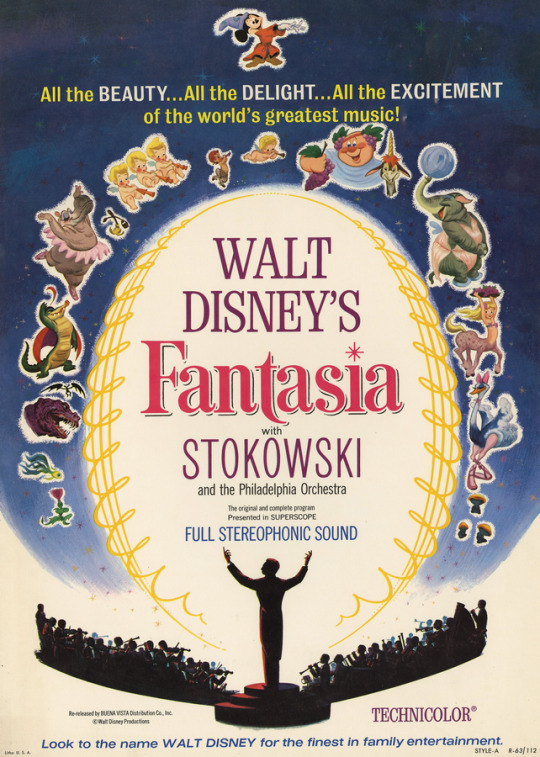
Honestly, this movie gives so much to talk about for an animation enthusiast. I think it warrants writing some thoughts about each segment.
Toccata and Fugue in D Minor(Johann Sebastian Bach): A powerful musical piece to start, but visually speaking it's not the strongest opening. While I do appreciate(immensely I might add) that Disney did NOT go for the stereotyped scary imagery associated with this piece but instead something more sublime (given the dynamic range the toccata actually offers), the abstract imagery doesn't necessarily lend anything substantial to the music, even when it goes from dark places to the very heavens. That is, when the animation actually starts, since a not so small segment of the short is the performers shot in silhouette. Stokowski's arrangement of the piece isn't the most evocative version of this musical milestone either.
Still, on a technical level, the animation is remarkable, and given the significant shifts in the musical structure they did what they could.


---
Nutcracker suite(Pyotr Ilyich Tchaikovsky): While the narrative is less abstract, it's certainly not very defined either. The animation, however, is much more evocative and beautiful to look at, with soft movements of ballet like quality; all too fitting for the piece.
Given it is associated to a narrative that is already well defined, the animators pretty much gave themselves a challenge by pursuing a significantly different direction that, while still using imagery related to fairies, it has a focus entirely put on the beauty of nature. Giving flowers and mushrooms alike anthropomorphic qualities but also allowing them to just move at the pace of the wind, the effects animation here is as stunning as it is educational for any aspiring animator. Colorful and soft, it's just a visual delight.

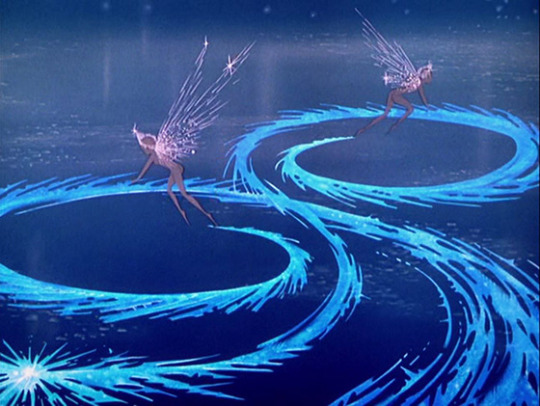
---
The Sorcerer's Apprentice(Paul Dukas): By far the most popular and well known segment of the film, this short based on a poem from Goethe puts Mickey Mouse in the role of said apprentice under the guide of Yen Sid(subtle reference right there). The irony of the impressionist piece being the first one to get a proper narrative aside, this short is still as charming as ever was.
While the effects animation isn't any less remarkable(in fact, my hat goes off for all those involved in the water animation of this segment), the pressence of Mickey Mouse and the broom make the character animation be the star of the show this time, and it still holds up. It goes all the way to show the power of well composed body language that you can follow the story even without Taylor's prior introduction.


---
Rite of the Spring(Igor Fyodorovich Stravinsky): A piece from the only composer that was still alive to see the film(who also GREATLY disliked the interpretation of his piece, calling the performance execrable) this is a valiant effort of wordless stoytelling with creatures of minimal anthropomorphic qualities.
While Taylor's introduction already hammers in the era in which this was made(he has to tiptoe around calling scientific observations "facts" to not get flak from conservative Christians), the representation of dinosaurs is anachronistic and dated as well, so is the vagueness of what destroyed them(the crater of the meteor that caused their mass extinction wasn't discovered until 1978).
Still. the segment creates genuine feelings of menace from the Tyrannosaurus Rex, and the effects animation is still remarkable(special mention goes to the magma and the smoke, even though fire doesn't look quite right in some shots). It does what it sets to do in presenting the power of nature.


---
Intermission/Meet the Soundtrack: The brief jazz number by the orchestra is nice, and honestly, the Sound track is pretty adorable for a non descriptive collection of shapes. It's also impressive how they managed to give different sounds visual abstract equivalents.


---
Pastoral Symphony(Ludwig van Beethoven): The only part of Disney's Movie canon to feature female nudity along with the Night on Bald Mountain segment(at least until later rereleases), it's whimsical depiction of Greek Mythology still manages to be more accurate to the source material than future endeavors of the company such as Hercules, humorously enough. The greek gods weren't nice people, and this segment has some fun with that(remember kids, Zeus is a jerk). The extremely simple love story between the centaurs is still wholesome though, and the imagery is very creative.
The animation complexity of this short lead to some small animation errors but you're not gonna notice if you're not looking for them. It also has in my opinion the most beautiful backgrounds of the film, rivalled only by some segments of the naturalistic beauty of the Nutcracker Suite.

---
Dance of the Hours(Amilcare Ponchielli): Charmingly innocent in a way that it's not seen very often anymore, it uses it's ballet roots in a fairly literal fashion by making a ballet number with different species of animals representing different hours of the day. The body language of these animals is just brilliant, they're expressive, carry a well defined movement to each one(that isn't realistic but definitely distinctive) and there's something inherently comical about how they dance, even when they do it effectively.
Honestly given the premise of the ballet this is the one short where I'd have gone abstract. I can't complain though, since the humorous gags and silly imagery just make it a sincerely funny experience, albeit not the most remarkable among the anthology(plus, female ostriches don't have the black and white plumage, but let's not get too nitpicky here).


---
Night on Bald Mountain/Ave Maria(Modest Petrovich Mussorgsky/ Franz Peter Schubert): Try to act surprised when I tell you the spooky segment is my favorite part of the movie. At the same time, however, I think it's warranted in this case. Horror is not something animation was known for back in the day. Even if movies like Pinocchio had some remarkably dark imagery, the medium in general was being pushed towards this kid oriented market, so this short was in many ways daring. And the end result both hits the mark with the fear and also happens to deliver one of the more complete narratives in the film. It's not just about the spooks, but the catharsis afterwards.
Chernabog(or as it is referred by Taylor, Satan himself) has such a commanding presence it's overwhelming. Even if you don't find him scary you WILL remember his face, full of wickedness and evil(Vladimir Tytla's animation of the character is one of the biggest achievements in the entire film, which is saying something). The imagery is adequately hellish as well, thanks to a masterful art direction that brings the shadows of Walpurgis night to life. The use of experimental animation techniques helped as well, with the ghosts requiring some clever use of distorted mirrors to create. And the release from the nightmare with the Ave Maria, which was the most demanding shot for the animators at the time(and not just on this project but maybe in animation as a whole at that point)? The perfect cap for a movie that made history for good reason.




So yeah, that's Fantasia. Man, that was a long one.
#roskirambles#animated films#walt disney#johan sebastian bach#pyotr ilyich tchaikovsky#paul dukas#johan wolfgang von goethe#igor stravinsky#ludwig van beethoven#amilcare ponchielli#modest mussorgsky#franz schubert#mickey mouse#chernabog#fantasia#greek mythology#leopold stokowski#deems taylor
4 notes
·
View notes
Text
Classical Music in La Corda (Part 2)
Related Links:
An Introduction to La Corda
Classical Music in La Corda (Part 1)
(Article also available on Medium)
===
La Corda d’Oro (Kiniro no Corda, 金色のコルダ), published by KOEI in 2003

The below list of pieces appeared in the game La Corda d’Oro that was first released on September 19, 2003.
===
Air on the G String (G線上のアリア)
Composer: Johann Sebastian Bach (バッハ)
Category: elegant (清麗)
Keywords: passion, compliment, determination, reputation, aura, people, confidence, flower, life
This piece originates from Bach’s Orchestral Suite №3 that is called “Air”. In the arrangement by August Wilhelmj (in 1871), the violin melody is transposed such that the entire piece can be played on the violin’s lowest string (i.e. the G string). While the original key of Bach’s version is in D major, Wilhelmj’s version is in C major.
Romanze (ロマンスト長調)
Composer: Max Reger (レーガー)
Category: vivid (彩華)
Keywords: resonance, creation, bride, student, education, passion, hometown, youth, home
Romance (Romanze in German) generally refers to any vocal or instrumental piece that has a tender, lyrical quality. This piece, originally for violin and piano (original version), was first published in the magazine Neue Musikzeitung in 1901. It now has multiple different versions, including for flute, clarinet and cello.
Valse Sentimentale (感傷的なワルツ)
Composer: Pyotr Ilyich Tchaikovsky (チャイコフスキー)
Category: gloomy (愁情)
Keywords: despair, dream, admiration, dedication, goddess, love, encounter, suffocation, marriage
Valse Sentimentale is one of the “Six Pieces (Six morceaux) for solo piano”, Op. 51 that Tchaikovsky wrote for the bourgeois salons in 1882. Each of the piece is dedicated to a different person, and the final movement Valse Sentimentale is dedicated to Emma Genton — an important woman in Tchaikovsky’s life. The melancholic melody gives a sense of romance while vividly depicts the image of a beautiful woman. My personal favourite is this version arranged for violin.
Sicilienne (シチリアーノ)
Composer: Anonymous
Category: elegant (清麗)
Keywords: family, children, goal, passion, promise, prospect, career
According to the official fanbook or the game, Sicilienne is composed by the blind Austrian Maria Theresia von Paradis (パラディス). Say even in this online video, the piece is attributed to Paradis. However, latest research revealed that it is very likely a musical hoax by violinist Samuel Dushkin, who published the piece in 1924.
Sicilienne (also known as siciliano or siciliana), is a form of dance music for Sicilian folk dance in Italy, which was popular during the 17th and 18th centuries. The genre is often characterised by dotted rhythms and gives a pastoral feel.
Humoresques (ユーモレスク)
Composer: Antonín Dvořák (ドヴォルザーク)
Category: vivid (彩華)
Keywords: childhood, celebration, resonation, desire, heart
This piece was written when Dvořák returned to his homeland Czechoslovakia (now The Czech Republic) during the summer of 1984. He had been working as the director of the Conservatory in New York in the United States between 1892 and 1895. The piece was originally composed for the piano, comprised of both Czech and American style melodies.
Later, Dvořák’s Humoresque №7 became the tune that can be heard on passenger train toilets in the United States — the singing begins with “Passengers will please refrain from flushing toilets while the train is standing…” (full song here).
Après un rêve (夢のあとに)
Composer: Gabriel Fauré (フォーレ)
Category: gloomy (愁情)
Keywords: sentiment, unrequited love, reputation, farewell, self, dream, quietude, reputation, longing
Après un rêve (After a dream in English) is one of the pieces from Trois mélodies that Fauré wrote for solo voice and piano between 1870 and 1877. The lyrics originates from an Italian poem that recounts a dream where one’s beloved can be seen. The following shows the translation in English by Richard Stokes:
In sleep made sweet by a vision of you
I dreamed of happiness, fervent illusion,
Your eyes were softer, your voice pure and ringing,
You shone like a sky that was lit by the dawn;
You called me and I departed the earth
To flee with you toward the light,
The heavens parted their clouds for us,
We glimpsed unknown splendours, celestial fires.
Alas, alas, sad awakening from dreams!
I summon you, O night, give me back your delusions;
Return, return in radiance,
Return, O mysterious night!
In the game you could play this piece with a violin duet, and I really like the arrangement. Unfortunately I cannot find anything similar online, but this is another arrangement for 2 violins and piano.
===
Thank you for reading!
Reference: 金色のコルダ コンプリートガイド
2 notes
·
View notes
Text
Classical composers upon receiving heartfelt gifts from a friend 🎁
╚══ஓ๑♡๑ஓ══╝

Chopin
Treasures and cleans it everyday while it sits undisturbed on his desk every day
Flower, cologne, gloves or an entire piano, all he ever wanted was something to hold precious
It showed, alongside the sweet feeling being loved, that they appreciated and remembered too
With a note attached to your gift as well, please expect a delayed response as he re-does his response each time a tear blots his writing
Will give you a gift no matter whether you gave it to him first, but he would make it extra special (;
┏━•❃°•°❀°•°❃•━┓
What did you mean? Had it succumbed to this? A mere note, triplet, rest of a piece of parchment on my desk. The petals, the flowers, scented to some lilac perfume, insignificant and dim— even Bach’s ashes wafted closer to our century’s etiquette. Handwritten note? Dashes and smiles, wet with perfume more than its smell punctured me awake. How many hours did you think I performed a week? How many students, gatherings, newspapers criticising my dandiness with their filthy hands, stained gloves, they held their journals with! And you still sent a letter and a bouquet of flowers as if they stayed intact and alive in the weeks of travel from Poland to Paris? What did you think you were? A messiah? A saviour of Poland so much that even Persephone’s breath would ferment your flowers for me to cherish? What? What impudence! That well-mannered judge of character, as if that pile of useless bandages had healed the cracks on your skull— your mute hands, which a sewing wheel had calloused more than a held note on the piano— the cracks, nooks and crannies— dripping, flooding, of homesickness for a city in which only your loved one slept in the confines of high society— while you starved in a wooden coffin for the exiled, weak and poor— why? Why? Why would you do this? To let your hopes wither away with only your blessing for me sprayed on fading perfume? Why? Why? Why? Because I loved you? Or was it because I loved you enough to have your ashes cremated in the hollow urn of my mind? Why? Why? Was I enough for you? Even when my footsteps trailed away as you planted flowers in them? Even when— even when— even when— could I be enough for you.
╭── ⋅ ⋅ ── ✩ ── ⋅ ⋅ ──╮
Schumann

He’s really so dreamy and out of this world, making one gift spark thousands of piece dedications
Poor guy lived in an asylum, attempted to hurt himself in many ways and suffered from depression.
Having someone offer him anything with a good will cannot cure him that moment, but will give him the strength he can’t muster.
┏━•❃°•°❀°•°❃•━┓
The winds grew soft like bundles of rests on sheet music. They gave birth to the dots and crannies of crochets, quavers and voices— a mellow whisper, like family, peopling the backdrop. Your gift lingered like perfume, a moment I peered through its keyhole of scents and beauty, into our liquor and feelings. The other:
What were they?
Could I only remember moment of you, encased all of this in song, could that be a funeral— a sound coffin—
Only if I could hold your wings, without a pin punctured through you, a magnifying glass sustained between us.
╭── ⋅ ⋅ ── ✩ ── ⋅ ⋅ ──╮
Salieri

this poor misunderstood composer was always depicted as overshadowed and bitter against Mozart
Quite contrary to public perception, he was caring, selfless and kind.
In reality, he acted generously; though his flaws dawdled him in pride and arrogance.
Upon receiving gifts from a beloved, a heartfelt note would do. Let alone flowers or grand gestures of jewellery, all this man needs is a humble kiss in letters and notes.
Serenades may do the trick (:
┏━•❃°•°❀°•°❃•━┓
I rise above street players and forgotten composers with my playing classical and bejewelled. Soft petals embroidered your letters— quill scratches cutting into paper deeper than the cologne you worked so hard to scent onto the parchment. I have concerts, lessons and operas to attend to, what may you bring onto the table besides wastepaper Beethoven could use to compose on?
I’m kidding, I’m kidding!
My dear beloved, no grand gestures and calligraphed words could enhance the lisped vowels and flushed sentences I spew from my clumsy tongue—
I speak and you better accept this madman’s outburst— as I speak, you have to listen for as whatever cheesy scribble you force on paper I must read—
I love you. That is all.
And that beats you in all types of serenades and sweets.
╭── ⋅ ⋅ ── ✩ ── ⋅ ⋅ ──╮
Schubert

Man lived a depressing, monotonous life compared to his grand, feverous music deluged in contagious passion.
While spending his life performing in socialite parties, the closest thing to a name he had ever got besides Schubert was ‘the little mushroom’
Day in and day out, his life containing only some letters wrapped in shrubs and bushes while Chopin clothed in purple prose and lilac gloves—
What? A letter?
Schubert trembled as he beheld a letter— for the landlord?
You!
*que a prolonged moment of gushing and internal sobbing as rivers of music drown from his mind to each letter— inked on your gift spelling “with love”*
All the man could do was smile and write back.
His stream of emotions, edited and crossed, copy-writed and repeated to a fraction of what he truly felt—
Thank you, dear friend. What can I do to repay you?
╭── ⋅ ⋅ ── ✩ ── ⋅ ⋅ ──╮
Paganini

A romantic, passionate flame of musical virtuosity rumoured to have the Devil fuel it himself, Paganini—
The gambler, womaniser and epitome of recklessness.
Labelled and misunderstood again by the public as purely a robotic showman, Paganini has truly emotional pieces on the guitar and violin.
His caprices encapsulated his feelings as much as any other Romantic piece.
┏━•❃°•°❀°•°❃•━┓
Upon receiving his gift, with a smile and a bittersweet glance at the signature he smudged—
“Thank you, dear,”
He would say as he pondered about what he would reply so as to not waste your time as you read his page-long letter with a manuscript behind your bundle of papers.
╰── ⋅ ⋅ ── ✩ ── ⋅ ⋅ ──╯
Authors note: Thanks for reading! Sorry for the hiatus. I just finished my finals! I hope to publish more frequently now!!
Thank you for all your support and feedback <3 I’ll get back to you as soon as possible (´・ᴗ・ ` )
More posts incoming these following days. I’ll stay online more often now (๑˃ᴗ˂)ﻭ
You can find more of me here
Stay tuned!! Tysm for reading (⁀ᗢ⁀)

#creative writing#classical music#classical music memes#chopin#prose#niccolo paganini#paganini#frederic chopin#fryderyk chopin#schubert#franz schubert#antonio salieri#salieri#richard wagner#wagner#schumann#robert schumann#classical music rpf#classical music meme
45 notes
·
View notes
Text
Highlights of the week.
Left the house a lot.
Days got noticeably longer.
Did medical quests.
Ate tasty things.
Fed crows.
Finished watching Vinci's Alessandro nell'Indie.
Listened to Bach's Alessandro nell'Indie.
Read Cicero's letter to Cassius in which he is the sun!
Read the introductory chapters of A Commentary on Cicero's Philippics 10 and 11 by Tia Dawes.
Dedicated time to studying Italian.
Started watching Frieren.
Watched The Pharmacist's Monologue episodes 17-18.
Got a haircut.
Wore nice clothes, looked good.
Bought colour paper.
Folded a fir tree and some bookmarks.
4 notes
·
View notes